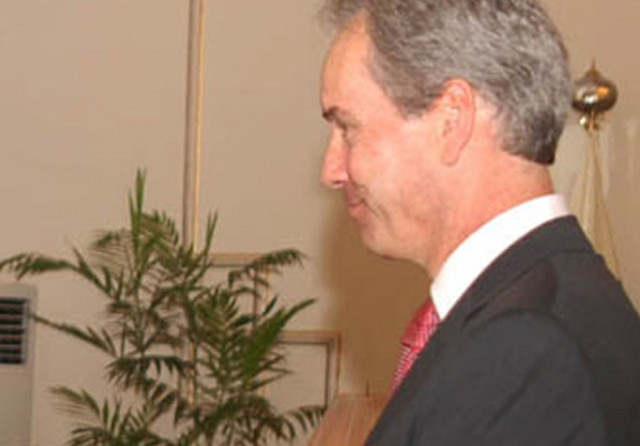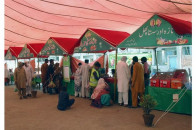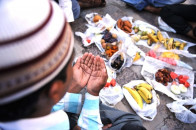Lessons from Switzerland: Efficient local governments key to development, says Swiss envoy
Swiss ambassador gives two cents on bilateral ties, social projects and future relations.

Ambassador of Switzerland to Pakistan Christoph Bubb. PHOTO: EnEWS
As Pakistan struggles to deal with its ethnic and sectarian conflicts, the country can look towards Switzerland for building communal harmony and social cohesion.
“The key lesson from Switzerland is that you have to cherish your minorities, respect and promote them,” said the Ambassador of Switzerland to Pakistan Christoph Bubb. “If the goal is to live together, it is important to give a bigger role to smaller groups.”
The ambassador was speaking to The Express Tribune about Pak-Swiss bilateral relations ahead of the Swiss Food Festival 2013 which will be held at the Swiss Embassy in Islamabad on Saturday.

The festival, which follows from a Swiss watchmakers’ exhibition in 2012, is an attempt to bring Swiss culture to Pakistan, Bubb said.
Switzerland, a country of around 8 million located in the centre of Europe, is a “centrepiece” where different European cultures come together. Famous for its watches, dairy products and chocolates, Switzerland is also known for its strong local government system.
The country is divided into 26 provinces or “cantons” which are further broken down into municipalities and these local governments are responsible for education, social services and policing, among other things.
“Local governance is a key element of our country and our political system,” the ambassador said.
Switzerland did not arrive at its local government system without a history of conflict and the system is still evolving --- smaller municipalities are merging into each other and more issues have moved to the federal government due to the need for national policies. But as Pakistan heads toward experimenting with local governance all over again, the Swiss system is a model to be studied nevertheless.
Bubb said Pakistan, at the moment, needs to find its own mix of local governance at the grassroots level and an overarching uniformity in local government systems nationwide. He said smaller groups should be considered an element of the nation’s richness.

However, the ambassador noted that “What works in one country cannot be applied in another country as it is. It needs to be adapted and reflected in each different cultural environment.”
Swiss Direct Investment
The Pak-Swiss bilateral trade figures are around $400 million with a surplus of Swiss exports to Pakistan. Pakistan mostly imports pharmaceuticals and machinery from Switzerland and exports textiles and agro products.
But the “real economic presence” of Switzerland in Pakistan is its foreign direct investment, Bubb said.
“Switzerland is a small country but it is the fifth largest direct investor in Pakistan,” he noted. “All major Swiss companies such as Nestle, Novartis and Clariant, among others operate production facilities in Pakistan.”
Bubb said Nestle alone, in addition to offering direct employment to Pakistani citizens, indirectly supports several hundred thousand Pakistani farmers who supply milk and other raw materials for the dairy giant’s production processes in Pakistan.
He said Pakistan’s agro products have the potential for international markets but challenges regarding quality assurance need to be overcome first.
Resolving the energy crisis is a pre-condition to improving the Pakistani economy, Bubb said.
“As a car does not run without a key, nor does an economy run without energy,” he said. “Energy is the key that makes the engine of an economy run.”
Social Development and Future Relations
Through the Swiss Agency for Development and Cooperation (SDC), which has been working in Pakistan for over three decades, Switzerland is working on rural development in Pakistan, Bubb said.
He said SDC efforts are concentrated in Khyber-Pakhtunkhwa and Fata and deal with improving livelihood and establishing small-scale renewable energy projects for rural communities.
“We are working on two micro-hydro power projects in two valleys in Chitral together with the Aga Khan Foundation,” he said. “Hydropower can be the best answer to providing electricity to remote areas.”
As humanitarian assistance, SDC has rebuilt 100 schools in Mansehra which was affected during the 2005 Kashmir Earthquake and the agency is now helping build schools in Swat, he said.
Switzerland has had diplomatic relations with Pakistan since 1949, with numerous bilateral agreements for trade and cooperation over the years, and the ambassador said he believed the two countries will continue to have great relations.
“We have had very constructive and friendly relations and it is my hope that trade and cooperation will increase as the security and governance conditions improve,” Bubb said.
Published in The Express Tribune, November 2nd, 2013.



















COMMENTS
Comments are moderated and generally will be posted if they are on-topic and not abusive.
For more information, please see our Comments FAQ